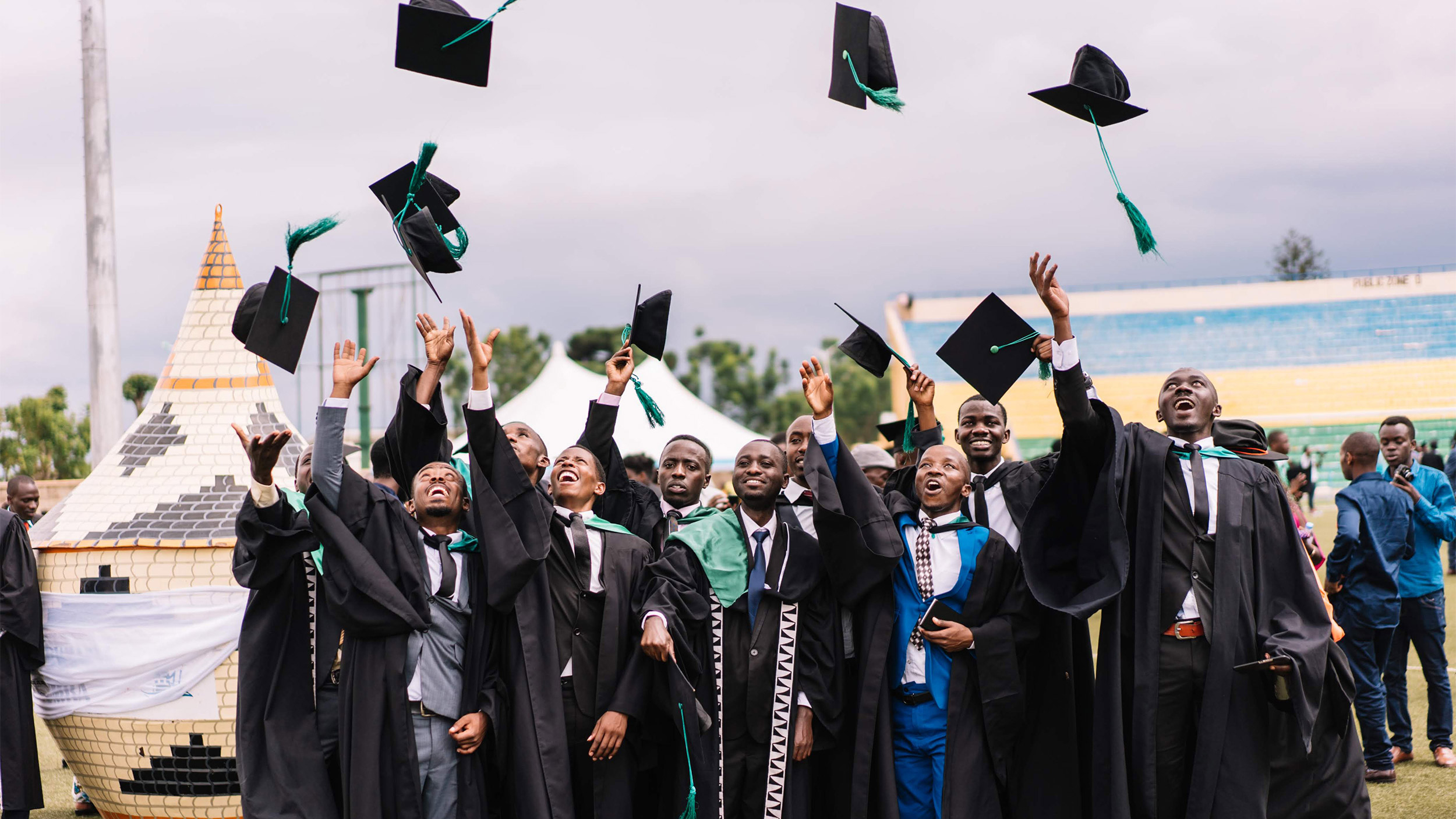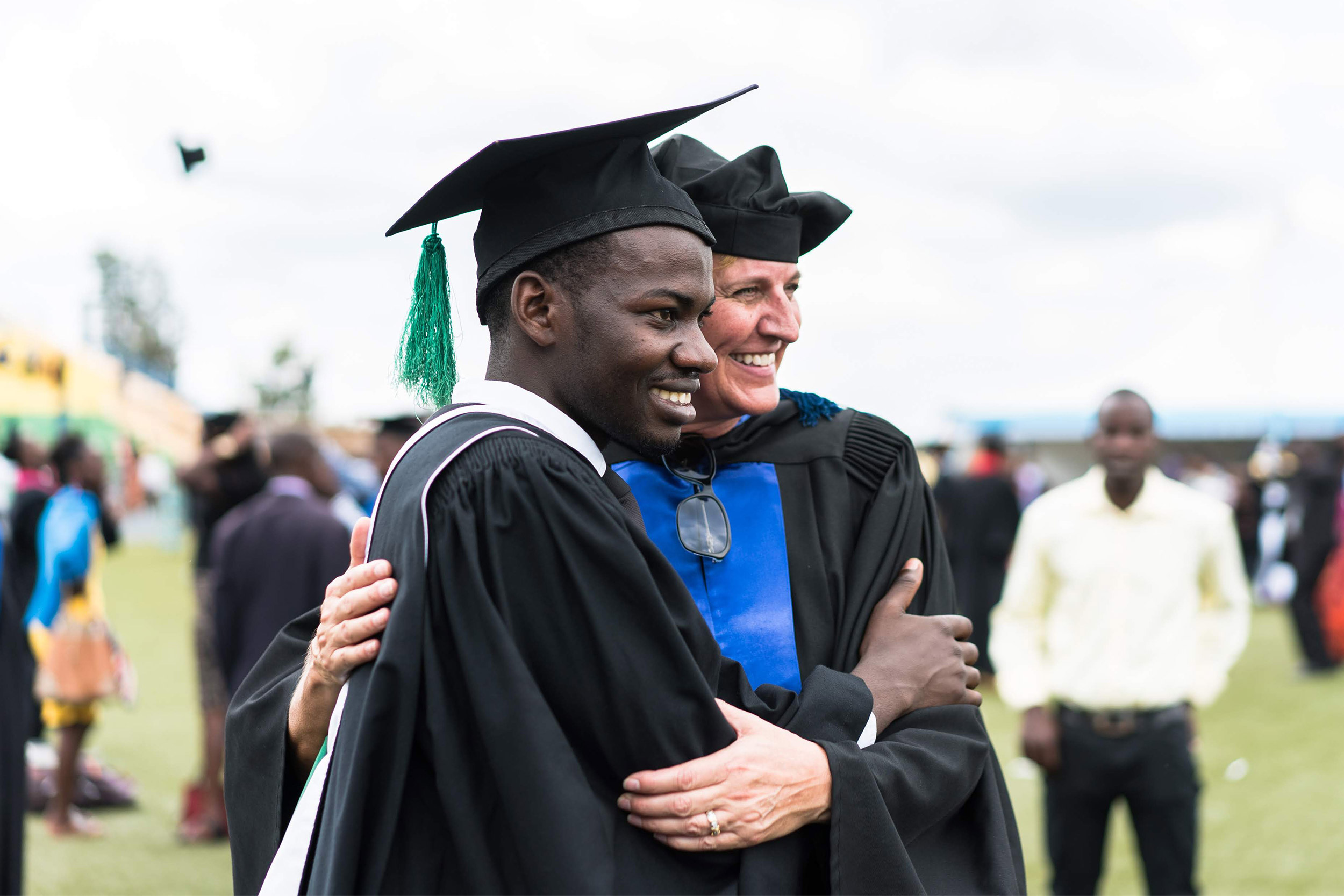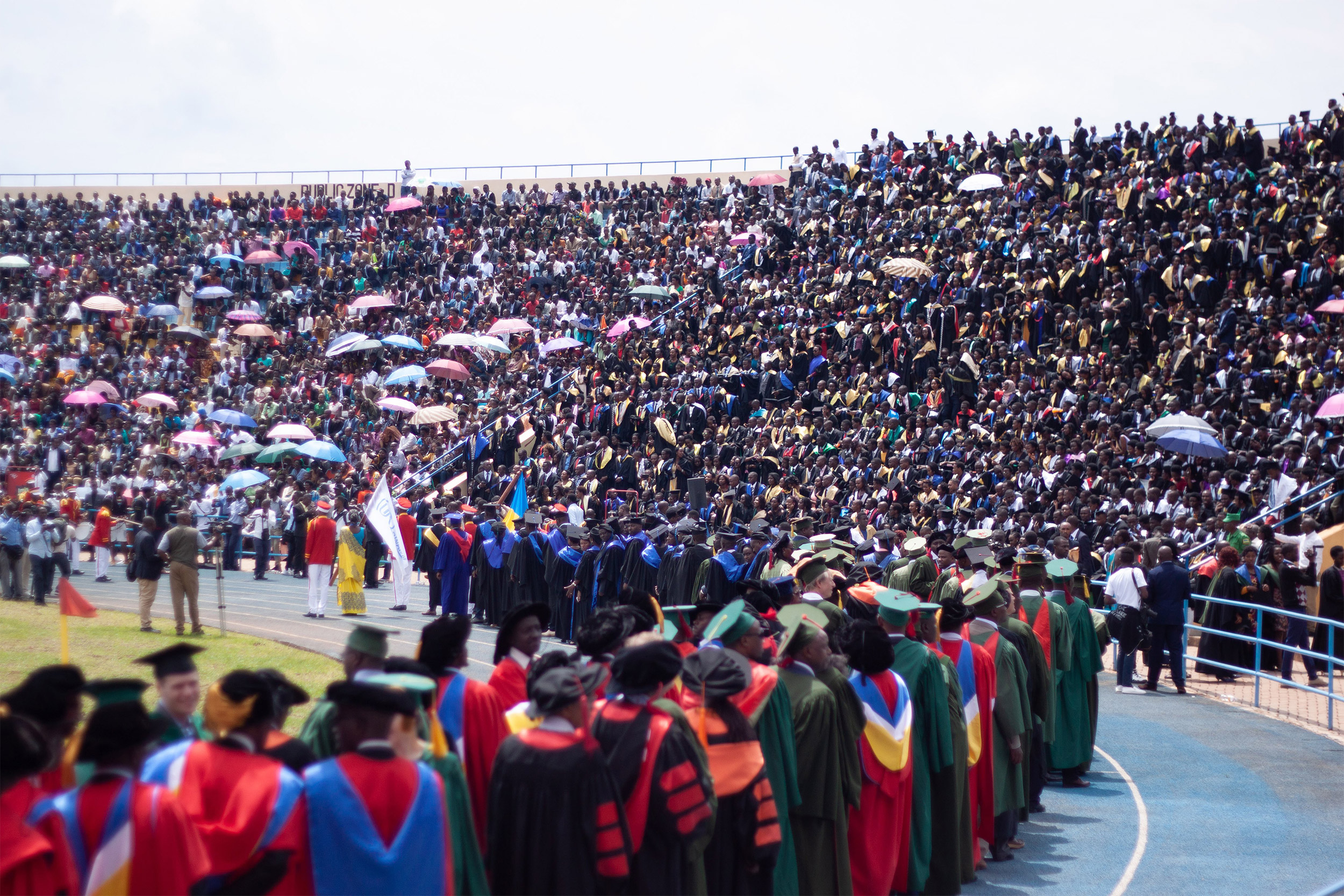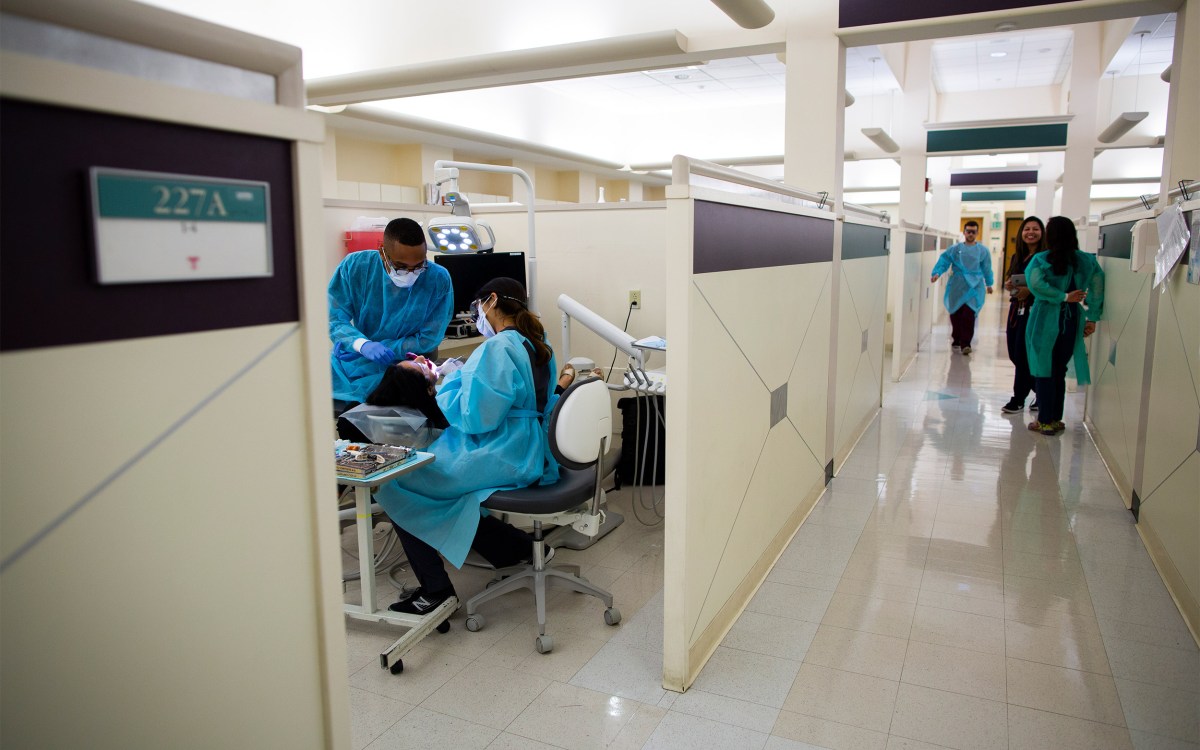10 dental grads give a nation something to smile about

The University of Rwanda’s first graduating class of dental surgeons. Harvard School of Dental Medicine joined forces to help the university launch the program.
Photos by Jordan Snowzell
University of Rwanda graduates first class of dentists
A jubilant crowd celebrated a victory in a soccer stadium in Huye, Rwanda, this past fall. The fanfare wasn’t for a soccer match, but rather for the commencement ceremony at the University of Rwanda — including its first-ever graduating class of dentists.
With a population of more than 12 million people and fewer than 40 registered dentists to serve them, adding 10 new graduates with bachelor’s degrees in dental surgery was a milestone for the future of the nation’s oral health.
Since 2011, Harvard School of Dental Medicine (HSDM) has been a leading partner in the effort to launch the new dental school and bachelor of dental surgery degree program at the University of Rwanda.
Donna Hackley, HSDM instructor in oral health policy and epidemiology, was in the crowd beaming with pride as the 10 newly minted Rwandan dentists marched past her to receive their degrees. Hackley had spent the past five years working with colleagues in Rwanda to see the achievement.
“It is an incredible blessing to be part of this historic moment in Rwanda. It is some of the most challenging, enjoyable, and rewarding work I’ve ever done,” Hackley said.
What it took to get there began 7½ years ago with an initiative started by Partners In Health (PIH), the Clinton Health Access Initiative (CHAI), and the Rwandan ministries of health and education. Together, the entities launched the Rwanda Human Resources for Health (HRH) Program — a program to advance medical education and improve health care delivery systems in the country.
Dental surgeon graduate Joseph Nshimiyimana with Harvard School of Dental Medicine Professor Donna Hackley.

“Given the connection of oral health to overall health, the rise of noncommunicable diseases, and the potential for preventive care to mitigate disease, it was critical that dentistry be included in the program,” said Jane Barrow, HSDM associate dean for global and community health.
Barrow urged representatives from HRH to include a dental school in their plans for a world-class education system for health professionals. An extensive planning process began with representatives from HSDM, the Rwandan ministries, the dental therapy program at the Kigali Health Institute, CHAI, PIH, and the University of Maryland with the goal of launching Rwanda’s first dental school and dental surgery program.
Brittany Seymour, assistant professor of oral health policy and epidemiology, accompanied Barrow on the initial HRH team visit to help make the case for a dental surgery program to the Rwandan ministers of health and education.
“We were thrilled to see dentistry included in this groundbreaking project,” Seymour said. “Being the first of anything is difficult, and we faced unique challenges starting the program from scratch, but this signified a transformative moment in global health: a movement toward contextually relevant approaches and ownership, long-term sustainability, and capacity-building for oral health education and delivery systems within the Rwandan national health system.”
A team of faculty and alumni served on site in Rwanda as faculty mentors and teachers, working with local colleagues to build the educational infrastructure from the ground up.
“We were very fortunate to have a dedicated team of Rwandan, HSDM, and University of Maryland faculty who brought a wide range of experience and expertise to the project and who were able to contribute in all aspects, from curriculum design and mentoring to research and community outreach,” Barrow said.
Brian Swann, assistant professor of oral health policy and epidemiology, was one of the early volunteers who served six months in Rwanda.
“I wanted be in the first wave of volunteers in order to better appreciate the culture of the people we were to serve,” Swann said. “Cultural sensitivity is vital. Together both teams had to learn how to best communicate in a way that was accurate. I also wanted people to know that we were in this program to stay and that we believed they had capacity to sustain their program.”

In the fall of 2013, the new school welcomed its inaugural class into the five-year dental surgery degree program. The students spent their first two years of training with their medical school classmates at the University of Rwanda’s School of Medicine in Huye before beginning dental training in the capital city of Kigali. They were steadfast in their desire to learn. The inaugural class adopted the nickname “The Pioneerz” and became close friends.
“Some of the students had never experienced a dental visit and did not know any dentists,” Hackley said. “This was not only a new school and program, but totally new territory for them, so they truly are pioneers. They were faithful and resilient throughout the program. I’m incredibly proud of all they have achieved.”
The learning curve went both ways, and faculty found they often had to keep up with the eager students.
“The passion for education and desire to gain knowledge among the Rwandese students is unmatched. As a faculty member, I involved myself with the students beyond the classroom to accommodate their thirst for knowledge. As a teacher, there is nothing more joyful than being surrounded by the knowledge-seeking eager students, and Rwandese students gave me enormous joy,” said Mohammed Razzaque, visiting professor of oral health policy and epidemiology.
Important work was also done outside the classroom to better understand Rwanda’s oral health needs. Last year, Hackley worked with colleagues in Rwanda and at Tufts School of Dental Medicine to plan and conduct the nation’s first oral health survey. The study found a substantial burden of oral diseases and conditions, with pediatric and adult populations having many unmet dental caries and periodontal treatment needs — underscoring the importance of greater access to dental care and the need for the new school. The results will inform workforce and delivery system planning, allow for oral health monitoring, and build research capacity.
“In rural areas we need more care. People outside of town suffer a lot because of lack of care,” said Julienne Murererehe, assistant lecturer at the University of Rwanda. “Graduation is a very big achievement not only for the students and faculty, but for the whole country. It’s important for the development of oral health services in Rwanda.”
HRH funding will provide ongoing support for the program for the next six years. HSDM faculty will continue to assist with curriculum delivery and provide technical and strategic support as the school shifts to its new campus.
“It was hard work,” acknowledged University of Rwanda School of Dentistry Dean Chrispinus Mumena. “We have done our best and worked together with team spirit, to reach farther than any one of us could reach alone. I am very proud of our graduating students. I am also very pleased with the collaborations between our faculty and the HRH Rwanda program.”
The Pioneerz have fulfilled their own dreams of becoming the first homegrown dentists prepared to serve their nation.
“I’m very excited and happy for today’s graduation, it is the day I have waited for, for a long time,” said graduate Joseph Nshimiyimana. “We are going to do our best to achieve more for our country.”






